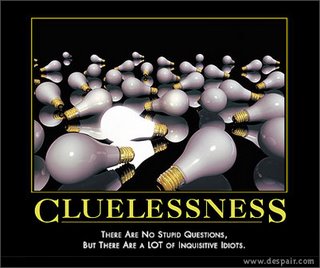Okay, so my two loyal readers know that for the last month I have been studying Philosophy for the first time in my life because God made me change my Gradual School major from MTS which required no Philosophy courses to MA which requires three sections of Philosophy. Still not real happy at God for the switch, but what are you gonna do in the face of that loving nudge in the right direction, I ask you?
Sadly I have absolutely no background in Philosophy whatsoever, unless you count the fact that my beloved Father majored in Philosophy at
St Ambrose so far back in the day that it was still a College. Unfortunately for me, philosophical principals do not pass genetically from father to daughter, and as much as I would love to ask dad for help, the phone rates to heaven preclude me from contacting him, though I do beseech him in prayer for any intercession his saintly life might allow -- hoping all those masses we had said for him have gotten him out of purgatory in time to assist me in this endeavor. Needing a bit more tangible help than that, I chose a few more substantial sources of assistance.
I rummaged through my devoted husband's college textbooks from 20+ years ago to find
this and went to my local booksellers and purchased a copy of
this . Then, I began to read. Everywhere I have been, from Dr.'s waiting rooms to my youngest daughter's softball league games I have carried a philosophy text for the past month. I have read so much philosophy that one would think that some would begin to sink in.
In between bouts of silent screaming, I am, I must admit beginning to assimilate some of what I am reading. Enough at least to offer this lesson in how to write like a Philosopher, just in case anyone is interested:
1) Choose a topic on which to ruminate, and then spend an inordinate amount of your time and energy refuting what previous philosophers and schools of thought have had to say on the particular subject.
2) Make sure to use as many polysyllabic words as possible, and the more syllables the better. This will serve two purposes, it will not only make you sound intelligent but make it harder for the less informed to refute your claims for fear of seeming stupid. (I refuse to admit how often I had to use a dictionary in order to read even the idiots guide)
3) Circular logic is often necessary in this form of writing. Embrace your inconsistencies with conviction. If you own them they will stand at least until the next guy refutes them in his(her) writings.
So, there you have it. On balance, I think I am doing an admirable job as a budding student of philosophy. And just to be sure I am staying in the right frame of mine, I purchased a copy of
this, and I have made
this one of my regular study breaks.
I can survive three courses in Philosophy. I may eventually learn to tollerate it. I still can't figure out why my dad
chose to major in this stuff?
Pax



















